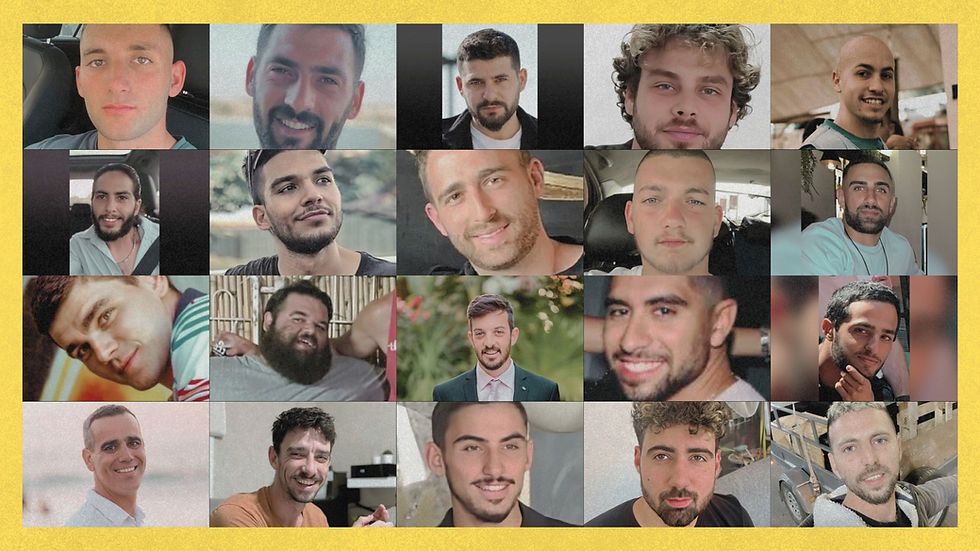Yom Shishi—Friday—In Israel
- Ron Cantor

- May 6, 2016
- 4 min read
Rami Kleinstein, Israel’s version of Elton John or Billy Joel, and like me, an American immigrant to Israel (albeit, he came as a child), has a song called Matanot Kitanot, or Small Gifts. In it, he speaks of the cultural experience of Friday. You see, there is no comparable thing in other countries to Friday in Israel. I am not merely speaking of Shabbat, which begins Friday night—but all that is Yom Shishi in modern Israel.
There are only two verses in this song, and I can only assume that his intention is to compare the Friday experience from his childhood to the Friday experience as an adult living in Tel Aviv. Let me explain. Friday as a child meant coming home from from school, mom cooking all kinds of ethic wonders and then, dressed in white, fathers take the children to the synagogue. After prayers a delicious multi-course meal—the Erev Shabbat meal—was waiting at home.
This meal is the central, galvanizing force of the Israeli family. I have no doubt that many broken marriages were saved as a result of the spouses realizing that divorce meant no Erev Shabbat family meal. Almost everyone—atheist Jews, religious Jews, not-so-sure-what-I-believe Jews—gather with their families for Erev Shabbat. Klienstein writes:
Another Friday, breathing the air, Light and shadow are playing “tag” again. The table is set, childhood photos on the wall, White processions are returning from the synagogue, And that smell which scratches my heart,Sneaking in and opening doors, To a small joy, to the same old song which is being passed along for generations.
But then Kleinstein grows up and marries a woman who would become one of Israel’s most beloved singers, Rita. Many years later, they divorce, as he continues his successful music career. Now in his fifties as a secular Jew living in Tel Aivi, it is different. For Tel Aviv’im (people from Tel Aviv), Friday morning is sacred. The kids are at school, but you are not at work. It is like Saturday morning in the U.S. but without children. Shabbat, or Saturday here, is family day, but Yom Shishi (The Fifth Day) is a break for the adults.
You go to a café, newspaper in hand—or more recently, your iPad. You could be alone or with friends. Maybe a date to the farmers’ market, like Elana and I had this morning.
For others it’s mountain biking on Mount Carmel or hiking through the hills surrounding Jerusalem. Or maybe a walk with your dog on Rothschild street in downtown Tel Aviv, with all it’s trendy cafés and restaurants. I presume that the adult Kleinstein, a Tel Aviv celebrity, seeks to convey this picture in the second verse.
I remember my first trip to Israel. On Friday night in June 1991, I went with Elana’s brothers to their Moroccan synagogue. Moroccan Jews are Sephardic (as opposed to Ashkenazi [European] like my family) and their style of worship is much more lively than the stoic chanting in Hebrew with which I grew up. Dressed in white we returned to Elana’s mother’s matchbox apartment and had a festive meal. I felt like I was dreaming and had gone back in time. Every family in that city was eating together.
That was 26 years ago. Fourteen years ago we moved to Israel and raised our kids here. However, in the past few years our children, now adults, have moved back to the U.S. How quiet Erev Shabbat has become for me and Elana. It’s hard. And a little sad. We are not used to ‘quiet’ on Erev Shabbat. And many of our friends who have dual citizenship are in the same boat. We joked about setting up an iPad at each table setting and using FaceTime to have our kids at the table.
But on the other hand, Elana and I, who had our first child nine months and three days after getting married, are enjoying the freedom at the young age of 50 of waking up on Yom Shishi, going to a café, shopping at the farmers’ market at the port of Tel Aviv or taking a walk on the beach—we are getting to live like a young couple, 28 years after the fact. That I like.
And with FaceTime, Skype and the like, our children are always only a few megabytes of bandwidth away.
Times change and so do we through the different stages of our lives. But one thing is sure: the Lord of the Sabbath, who does not change.
By the seventh day God had finished the work he had been doing; so on the seventh day he rested from all his work. Then God blessed the seventh day and made it holy, because on it he rested from all the work of creating that he had done. (Gen. 2:2-3)
Kleinstein ends his melodic tune with the words that we pray every week in the Kiddush, as we invite in the Sabbath, words that we will pray tonight at our congregation and will be chanted very shortly all over Israel:
Ki banu bacharta , ve’otanu kidashta…Baruch ata adonai mekadesh hashabat For thou hast chosen us and sanctified us…Blessed art thou, God, sanctifier of the Sabbath.













Comments